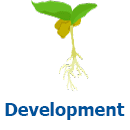 Developing a policy is a combination of technical, strategical, and political processes. It not only includes finding the right contents based on previous policy analysis and evidence from the field, but also finding the right level on which these contents shall be treated in a particular policy to have the greatest impact. In order to ensure compliance and right impact, the development of a policy must include complex and long participatory consulting processes with various stakeholders from all levels.
Developing a policy is a combination of technical, strategical, and political processes. It not only includes finding the right contents based on previous policy analysis and evidence from the field, but also finding the right level on which these contents shall be treated in a particular policy to have the greatest impact. In order to ensure compliance and right impact, the development of a policy must include complex and long participatory consulting processes with various stakeholders from all levels.
Policy Development Processes (10)
Type: Manuals and guidelines (how-to)
We should view extension policy as something beyond a statement of intent. It must be a means to develop strategies, procedures, and working relationships among a large number of other actors in the wider system where extension is situated. This note reviews the extension policy development process in four countries and examines some of the implementation challenges. It also highlights the need for more clarity on the purpose of policy, the importance of policy learning, and why efforts to achieve policy coherence are important for extension.
Type: Manuals and guidelines (how-to)
In the face of declining resources, national extension services need to review their priorities and modes of delivery. A policy framework that provides the national extension service and other actors with strategic direction can help to ensure that resources are targeted to where they are needed most in line with client needs and national priorities; that extension staff receive the appropriate training to carry out their duties; and that scarce resources are used more effectively through partnerships with NGOs and the private sector and use of information and communication technologies where appropriate. Monitoring and evaluating performance based on stakeholder feedback is also crucial to ensuring that extension staff skills remain up to date and relevant to client needs.
Type: Case study, experience, example
Power Point Presentation on the stages of Policy Cyle and Liberia’s experience in light of it. Most of the presentation focuses on the first two stages of setting the policy agenda and formulating policy, although some implementation issues are discussed. Lessons learned from the experience are also presented.
Type: Template and checklist
Academicians, research scholars and students are invited to participate in this ONLINE survey and JOIN National Extension Education Policy Campaign, without paying any membership fees - An initiative by TREx Watch (Teaching, Research and Extension Watch).
Type: Case study, experience, example
This paper explores the process of developing an agricultural extension policy in Bangladesh and describes the content of the final policy statement, as an example of the approach taken in one country to developing a facilitative environment for sustainable agricultural development.
Agricultural extension is moving away from externally imposed change programmes towards bottom-up planning, farmer participation and empowerment and catalysis of sustainable change, based on local needs and problems. However, many of these changes have been on a relatively small scale, in policy or institutional environments generally favouring a more traditional approach to agricultural development. For a broader process of sustainable agricultural development to occur, changes in the policy and institutional environment are required.
Type: Manuals and guidelines (how-to)
This book, and indeed the wider extension network in Australia, is replete with examples and models of various extension approaches that are employed by intervening agencies seeking to enable desired change(s) in sustainable production and/or natural resource management. Chapter 1 paints a picture of extension as a policy instrument, or a method or mechanism used by government and government agencies as well as other institutions including business to achieve a desired effect (also see Vanclay and Leach 2006)1. This chapter provides a perspective on extension policy in Australia, a framework in which a national extension policy platform can rest and a process model for negotiation of effective extension policy as an effective instrument for enabling change.
Type: Case study, experience, example
For those policy-makers who would like to refresh their knowledge of the concept of extension, this is a practical guide to provide need- and demand-based knowledge and skills to rural men, women and youth in a non-formal, participatory manner, with the objective of improving their quality of life. The function of extension may be applied to several subjects, both agricultural and non-agricultural, such as health; when it is applied to agriculture, it is called agricultural extension.
Type: Conceptual (definitions and frameworks)
This brief focuses on three questions:
- What are the benefits of developing a policy framework for agricultural and rural extension systems?’
- What are the role and priorities of extension systems and how should they be developed?
- What support measures should be put in place to ensure that extension is delivered effectively in the region?
SPC Policy Brief #12
Type: Case study, experience, example
Presentation held at the Future Agricultures Consortium, Institue of Development Studies from 6-7 December 2012.
Type: Case study, experience, example
This paper aims at learning lessons from recent extension policymaking practices in Benin, Burkina Faso, and Niger in West Africa. Similar policymaking processes lead to context-based extension policy content. However, extension policy should include (i) strategic partnerships with the private sector, research and education organizations, (ii) self-renewal mechanisms for responding to environmental changes, and (iii) mechanisms for national extension systems to take advantage of global experiences of policymaking, implementation, and evaluation.

